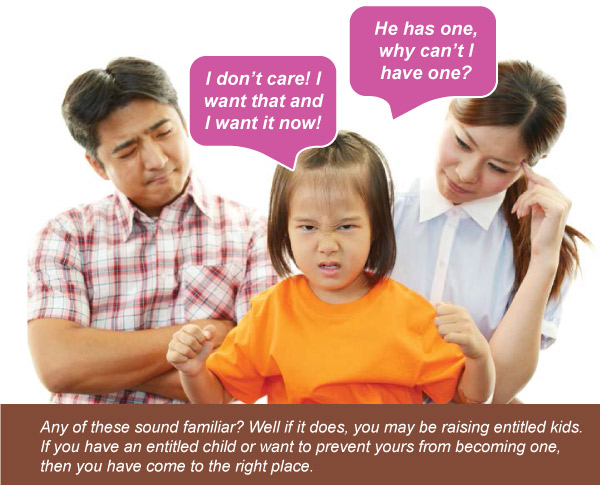One who feels entitled gets frustrated, insulted or offended easily. This kind of person lives a pretty miserable life. Want a happier life? Stop feeling so entitled. There is much more to life than our ownership of transient things and ideas that do not last.
Entitlement is something that we think we are entitled to or inherently deserve. Children may develop this sense of entitlement, if they are allowed to believe that they can get or deserve anything they want, at all cost. This sense of entitlement is a false one.
Once your child grows up and goes out into the real world, he/she will have to work for what they want, just like everyone else. The key is to teach your child the value of hard work and shared responsibilities for what we get back.
The Spoilt Brat
A main concern that comes from this false sense of entitlement is being a “spoilt brat” who expects to be given everything that he/she wants. You see this false sense of entitlement in frequent expression of jealousy, complaints of unfairness towards them, as well as demanding attention, praises, favours, or gifts, that leads to frustrations and misery on both sides – child and parents.
The concept of ‘fairness’ on the other hand, starts to appear in children when they realise that getting something that others have is an acknowledgement of being distinguished as an individual. Hence, it is only natural that they feel jealous. Jealousy can even be seen in animals such as apes, dogs and cats. However, as natural as jealousy or the concept of fairness are, it is wise as parents not to give in to children’s demands all the time, as this would give them a false sense of entitlement that would become very problematic as they grow older.
Deal With It
In life, you do not always get what you want and there will always be conflicts of interest when other people are involved. Therefore, children need to know how to adapt and cope with not getting what they want. Children learn about entitlement very early on from watching people around them, especially once they understand the concept of ownership and the ability to obtain things they want. Very soon they start to feel that the world revolves around them and that they are entitled to everything their hearts desire.
As such, they usually get upset and throw a tantrum if they don’t get what they want. Don’t give in so easily, let them cope with disappointment and explain to them the reasons why they can’t have everything go their way. Speak the truth but lace it with affection to let them know you mean well.
Putting Things Into Perspective
Part of human socialisation is the concept of being entitled or deserving of praise and rewards; this is also considered a sense of entitlement. It is important that children learn that this kind of entitlement is temporary and context driven. Just because one has been called, “Good boy” or “Clever girl” does not mean they can never do any wrong or make a mistake. A child with a false sense that they are always going to be good or clever are at risk of forming a black-and-white pattern of thought, that assumes they must always be praised or they should be punished.
This can be a significant problem as they grow into adolescence where their emotions like disappointment may become impulsive reactions. Many secondary school teenagers feel that they deserve high grades just because they are “clever”.

To prevent a false sense of entitlement parents should teach their children adaptive behaviour skills and attitudes:
- If you really want something, you need to earn it for yourself – go out there and work for it. n Disappointments i.e. getting what you don’t like, or not getting what you like, is part of life and not due to who you are.
- If one way is blocked, use another way until you finally get to where you want to go.
- If you haven’t got the skills, learn them. You gain nothing by lying around moping and feeling sorry for yourself.
- Encourage the celebration of skills in others and the self – this reduces the chance of jealousy as your children grow up, plus this attitude nurtures friendships and feelings of gratitude.
- Learn to be grateful and create an environment of giving.
- Being a good example to your child – Children learn from watching their parents and people around them and therefore remember to practice what you preach.
Parents also need to remember to encourage diligent work and determination by rewarding your child’s efforts. Provide plenty of opportunities for them to learn skills and cope with disappointments, so that you can show them you value their willingness to adapt, learn and achieve. The world in constantly changing and adaptation is key. Feeling entitled only keeps you stuck and one point and this would bring pain when things change around you.
An educational collaboration with Malaysian Society of Clinical Psychology







Comments